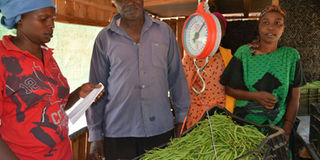Mobile phone transforms farming in Isiolo County

Farmers in Isiolo weigh French beans for sale. Frontline SMS services in the county, is revolutionising farmers prospects by providing farming extension services to them. FILE PHOTO | NATION MEDIA GROUP
What you need to know:
- Messages are sent in bulk to 250 mobile phones spread across the county, reaching more than 60,000 people.
- Farmers are able to plan appropriately based on weather projection for the season.
- The ease of market access using mobile phones has now seen communities around Isiolo, a traditionally livestock region, diversify to food production, cutting down dependency on relief food.
Mobile phone is rapidly revolutionising farming in Isiolo County. Pastoralist communities in the county, one of the driest areas in the country, now use solar-powered mobile phones to not only predict the weather, but also obtain market information through SMS.
Given the remoteness of their homes, many previously had trouble accessing markets for their livestock and often relied on brokers who capitalised on their miseries to offer dismal prices for produce.
However this is changing, thanks to the mobile phone.
“Sometimes my cows fall sick and I do not know what they are ailing from. I send a text in one of the mobile platforms that deal with farmers and they reply back with important information, making it easy for me to identify the disease and get appropriate medicine,” says Mr John Losunyen, a farmer.
ActionAid is running The Frontline SMS service in the county and it uses a computer to send out messages gathered from the National Drought Management Authority, the Kenya Meteorological Department and the Ministry of Agriculture. This enables farmers to plan appropriately.
The messages are sent in bulk to 250 mobile phones spread across the county, reaching more than 60,000 people.
With this information, farmers are able to plan appropriately based on weather projection for the season.
FORECAST FOR THE SEASON
“It is now easy for us to plan because after sending an SMS to the mobile platform requesting the weather forecast for the season, it tells us the projections on rains, helping us to plant crops that can withstand drought if rains will be low,” says Ms Veronica Ero.
“For instance, last year we were informed that there would be El Nino and we were advised to cultivate large tracts of land as there would be enough rainfall. We followed the instructions and we harvested plenty of food in the last season.”
The ease of market access using mobile phones has now seen communities around Isiolo, a traditionally livestock region, diversify to food production, cutting down dependency on relief food.
“I am able to send a text to any of the mobile platforms to inquire the price of say vegetables and this has helped in eliminating the brokers who used to benefit unfairly from our labour as I can now easily get a ready market,” says Ms Ero.
While traditional media such as radio and television have played a major role in extension services and development, growth in the Internet and increased use of mobile technology are seen as game-changing, because they not only provide instant information, they also help to cut cost of having to visit each village physically.
For now the farmers are only producing enough for their households, but they have formed a small-holder farmers’ association to enable them pool together and sell any surplus in bulk.




